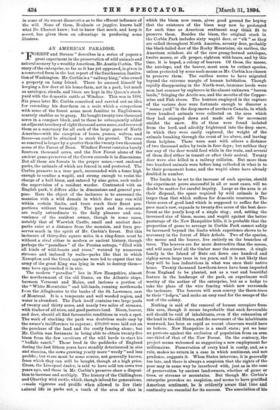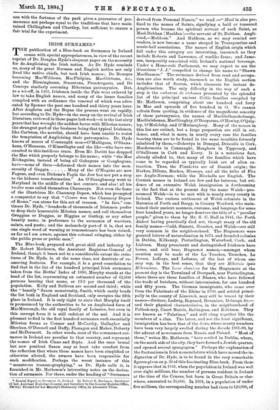AN AMERICAN PARADISE.
.FOREST and Stream " describes in a series of papers a great experiment in the preservation of wild animals and natural scenery by a wealthyAmerican, Mr.Austin Corbin. The story of the enterprise, so far as it has yet appeared, is given in a connected form in the last report of the Smithsonian Institu- tion of Washington. Mr. Corbin is a " railway king," who owned a property on Long Island. There he amused himself by keeping a few deer at his home-farm, not in a park, but much as antelopes, elands, and bison are kept in the Queen's stock- yard with the domestic cattle at Windsor. This was in 1886. Six years later Mr. Corbin conceived and carried out an idea for extending his deer-farm on a scale which a comparison with some of the forest areas most familiar to Englishmen, scarcely enables us to grasp. He bought twenty-two thousand acres in a compact block, and to these he subsequently added an adjacent territory of eight thousand acres more, and reserved - them as a sanctuary for all such of the large game of North America—with the exception of bears, pumas, wolves, and foxes—as could be obtained to stock the ground. The area so reserved is larger by a quarter than the twenty-two thousand acres of the Forest of Dean. Windsor Forest contains barely fourteen thousand acres, and the New Forest alone of the ancient game-preserves of the Crown exceeds it in dimensions. But all these are forests in the proper sense,—not enclosed parks, the animals of which are fenced in and protected. The Corbin preserve is a true park, surrounded with a fence high enough to confine a wapiti, and strong enough to resist the charge of a bull bison, and entered by nine gates, each under the supervision of a resident warder. Contrasted with an English park, it differs alike in dimensions and general pur- pose. Here the object of the inclosure is to surround the mansion with a wild domain in which deer may run wild within certain limits, and trees reach their finest pro- portions without formality. The park and its contents are really subordinate to the daily pleasure and con- venience of the resident owner, though in some cases, notably that of Warwick Castle, small and ancient deer- parks exist at a distance from the mansion, and form pre- serves much in the spirit of Mr. Corbin's forest. But this inclosure of thirty-five square miles in a ring-fence must be without a rival either in modern or ancient history, though perhaps the " paradises " of the Persian satraps, " filled with all kinds of wild-beasts and trees," watered by numerous streams and inclosed by walls—parks like that in which Xenophon and the Greek captains were led to expect that the army of the great Xing was lying in wait to destroy them— may have approached it in size.
The modern " paradise " lies in New Hampshire, almost the northernmost of the old States, on the Atlantic slope, between Vermont and Maine, and incloses a portion of the " White Mountains " and hill-lands, running northwards from the Alleghanies to the banks of the St. Lawrence, east of Montreal. It is a temperate and well wooded region, and water is abundant. The Park itself contains two large pools of twenty and thirty acres, and nearly two miles of streams, with timber of all sizes, and good pasture-land. Bison, beaver, and deer, should all find favourable conditions in such a spot. The work of stocking the park was doubtless made easy by the owner's indifference to expense ; £80,000 were laid out on the purchase of the land and the costly fencing alone ; but Mr. Corbin was fortunate in being able to obtain twenty-five bison from the few survivors of the wild herds to start his "buffalo ranch." Those bred in the paddocks of England during the last fifteen years have steadily deteriorated in size and stamina, the cows growing yearly more " weedy " and less prolific ; but there must be some source, not generally known, from which they can still be bought, though at a high price. Cross, the Liverpool dealer, is said to have sold ten cows two years ago, and those in Mr. Corbin's preserve show a disposi- tion to increase and multiply. The history of the Chillingham and Chartley wild cattle, which, though inbred for generations, )emain vigorous and prolific when allowed to live their Latural life in parks not a tenth of the area of that in which the bison now roam, gives good ground for hoping that the existence of the bison may now be prolonged for such time as American sentiment may think fit to preserve them. Besides the bison, the original stock in the Corbin Park includes sixty wapiti deer, or " elk " as they are called throughout North America, seventy deer, probably- the black-tailed deer of the Rocky Mountains, six cariboo, the- American reindeer, six of the rare prong-horned antelopes,. twelve moose, or elk proper, eighteen wild-boars, and by thia time, it is hoped, a colony of beavers. Of these, the moose, the antelope, and the beaver, must soon be extinct species,. unless protected by some such means as Mr. Corbin has chosen to preserve them. The cariboo seems to have migrated beyond the extreme margin of human habitation. Though rapidly disappearing in the North-west, immense herds were- seen last summer by explorers in the almost unknown " barren lands," fringing the Arctic sea, and the mouths of the Copper- mine and Fish rivers. The hunters employed in the capture- of the various deer were fortunate enough to discover a. "moose yard " in the deep snows of northern Canada, in which- three hundred animals were collected on the area which they had stamped down and made safe for movement amidst the snow. Six of these were found isolated from the herd, and adroitly frightened into the deep snow,. in which they were easily captured, the weight of the- animals breaking through the crust of ice above, and leaving them helpless. These were sent with others a distance of two thousand miles by train in four days ; but neither they nor any of the deer would feed while in the train, and several. of them died either in transit or after their arrival. Twenty deer were also killed in a railway collision. But more than two hundred animals were before long collected in what is to be their permanent home, and the wapiti alone have already- doubled in number.
The limits to be set to the increase of each species, should• the experiment prove successful in all or most cases, will no doubt be matter for careful inquiry. Large as the area is at their disposal, the space required by wild animals is far larger than that which suffices for domestic creatures. The- three acres of good land which is supposed to suffice for the- poor man's cow, expands to twenty-five acres of the best deer- forest as the yearly keep of a single stag ; and, setting the increased size of bison, moose, and wapiti against the better- pasturage of the New Hampshire hills, it is probable that the- proportion of game to acreage in Corbin Park cannot safely be increased 'beyond the limits which experience shows to be necessary in the forest of Blair Athole. Two of the species,. the moose and the beaver, live entirely on the branches of trees. The beavers are far more destructive than the moose,. and will soon level all the timber near the streams. A single- family in the Island of Bute cut down one hundred and- eighty-seven large trees in ten years, and it is not likely that they will be less industrious in what was once their native- home. Twenty thousand hawthorn-trees have been imported from England to be planted, not as a vast and beautiful feature in the landscape of the park, an experiment well worthy of the author of the enterprise, but as a hedge to- take the place of the wire fencing which now surrounds. the inclosure. The beavers will soon convey the thorn-trees. to their " lodges," and make an easy road for the escape of the- reat of the colony.
Nothing is said of the removal of human occupiers from. this area, though it seems improbable that such favourable soil should be void of inhabitants, even if the exhaustion of- the land in the old States, and the movement of the inhabitants- westward, has been as rapid as recent observers world have us believe. New Hampshire is a small state ; yet we hear- no protests against the exclusion of population from an area one-third of that of the New Forest. On the contrary, the project seems welcomed as suggesting a new employment for millionaires. Preservation of every kind is costly, and, as a, rule, makes no return in a case in which sentiment, and not- prudence, suggests it. When States intervene, it is generally too late, and there is always a suspicion that the rights of the may in some way be interfered with, just as in the case- of preservation by ancient land-owners, whether of game or- trees, or streams or mountains. But though Mr. Corbin's enterprise provokes no suspicion, and seems to have gratified American sentiment, he is evidently aware that time and continuity are essential for its success. The association of his
son with the fortunes of the park gives a guarantee of per- manence not perhaps equal to the traditions that have main- tained Chillingham and Chartley, but sufficient to ensure a lair trial for the experiment.



































 Previous page
Previous page